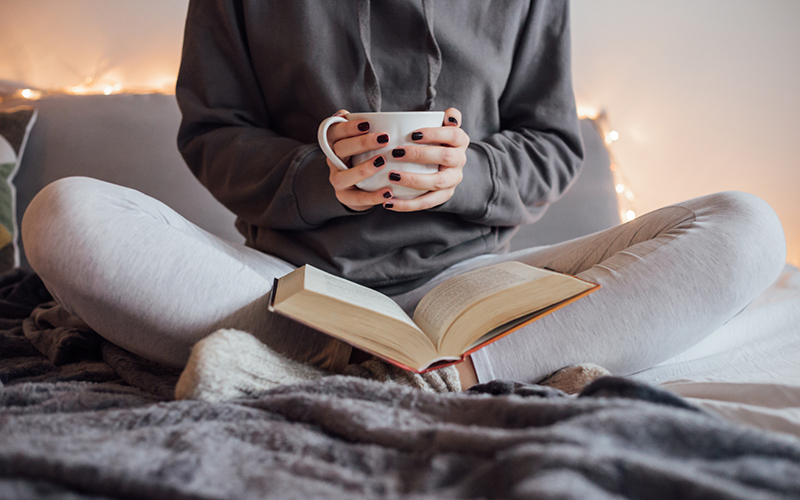
by Maria Luci, editor at Maria’s Farm Country Kitchen and Rodale’s
Sleep is a beautiful thing. It’s healing and restful, and it’s the gateway to the magical world of dreams. And yet, while most of us know that sleep is vitally important and that sleep deprivation can cause everything from a weakened immune system to impaired memory function, we continue to deprive ourselves of the necessary amount of slumber night after night.
The truth is, most adults need between seven and nine hours of sleep, and in the winter, that number can go up even higher (think hibernation). Yet, we fight nature almost every night, staying up late, stressing about the day ahead, and watching television—all of which leaves us feeling exhausted on weekdays and desperately trying to catch up on sleep on the weekends. But you can put an end to this desperate sleep cycle…and naturally, too!
For everyone looking for a better night’s sleep, or simply wanting to catch a couple extra hours of shut-eye during the colder months, here are our top 8 tips to naturally sleep like a dream all winter long:
1. Eat sleepy. Support sleep with calming foods like turkey and salmon, which contain the relaxing amino acid tryptophan. Choose snacks that are rich in magnesium—pumpkin seeds, bone broth, and chickpeas, for example—which can also help stimulate sleep. Walnuts are a great choice when choosing a food to help you sleep, as they’re chock-full of a number of nervous-system-relaxing nutrients. Research has also shown that enjoying a small snack with both carbs and protein an hour before bedtime can help calm the brain and prep your body for sleep. Just be sure to avoid caffeine after lunchtime and stop drinking alcohol at least three hours before bedtime.
2. Get clean. Clean your body and your room to feel fresh and promote relaxation: Use natural and organic products to avoid hormone-disrupting chemicals; declutter your bedroom to reduce stress, and put fresh sheets and cozy blankets on the bed. Then hit the bathroom to dry brush your skin, exfoliate the day away, enjoy a therapeutic milk bath, relax with a winter facial steam, and/or slather on some organic coconut oil before moving on to Step #3…
3. Dream in comfort. Make your room an oasis, your bed a cloud, and your sleepwear super soft. The right pajamas will have you counting down the hours until bedtime. Try this Organic Cotton Long Sleeve Piped Pajama Set, which is perfect for an unforgettably comfy-cozy night of sleep.
4. Smell the “roses.” Use aromatherapy to start the relaxation process. The aromas of organic chamomile and lavender oil can help you fall asleep faster. Add a drop of these essential oils to a cotton ball by your pillow, or use products containing natural lavender oil—such as this Organic Balance Facial Toner—before bedtime to help promote calm and sleep.
5. Turn it off. Turn of the television, lights, and screens—they can mess with your sleep—and instead, grab a book or magazine, meditate, or simply count the stars. Still can’t doze off? Make a mental list of all you have to be thankful for, starting with the big things and going down to the littlest of blessings. Gratitude has been shown to improve sleep quality and help combat insomnia.
6. Get it on. A little roll in the hay can help promote sleep because sex produces the hormone prolactin, responsible for feelings of relaxation and sleepiness, and decreases the production of the stress hormone cortisol. On top of this, estrogen levels also rise in women during intercourse, which, according to Women’s Health, “can enhance a woman’s REM cycle for a deeper sleep.” Get things started (with a partner or yourself!) with a wink and some Organic Lubricant & Personal Moisturizer, and enjoy a chemical-free intimate experience before your equally satisfying 40 winks.
7. Turn down the heat. According to the National Sleep Foundation, the best temperature for sleeping is around 65 degrees. Keeping your room cooler at night helps work with your body’s natural temperature during sleep and can help fight insomnia while keeping you asleep longer.
8. Stick to a sandman schedule. Overindulging on sleep on weekend mornings to make up for a lack of shut-eye during the week might feel good, but recent studies have shown that it can make you even more tired once Monday rolls around again. Instead of sleeping in on Saturdays and Sundays, try going to bed earlier a little on weekends and waking up around the same time you normally do on weekdays, as our friends at Men’s Health suggest—this way, your internal clock stays on track and you won’t feel like chucking your alarm clock across the room when it goes off again on Monday morning!
If all else fails, take a nap! A 40-minute nap has been shown to increase energy and alertness afterward.
 Maria Luci is the manager and editor at Maria’s Farm Country Kitchen and content creator and editor at Rodale’s. She grew up in Virginia, but now lives in Philly with her husband, a black cat, and a giant Aloe plant named Big Al. When not writing and editing, she’s usually cooking up organic recipes or running—or eating when she should be running.
Maria Luci is the manager and editor at Maria’s Farm Country Kitchen and content creator and editor at Rodale’s. She grew up in Virginia, but now lives in Philly with her husband, a black cat, and a giant Aloe plant named Big Al. When not writing and editing, she’s usually cooking up organic recipes or running—or eating when she should be running.




No comments yet.